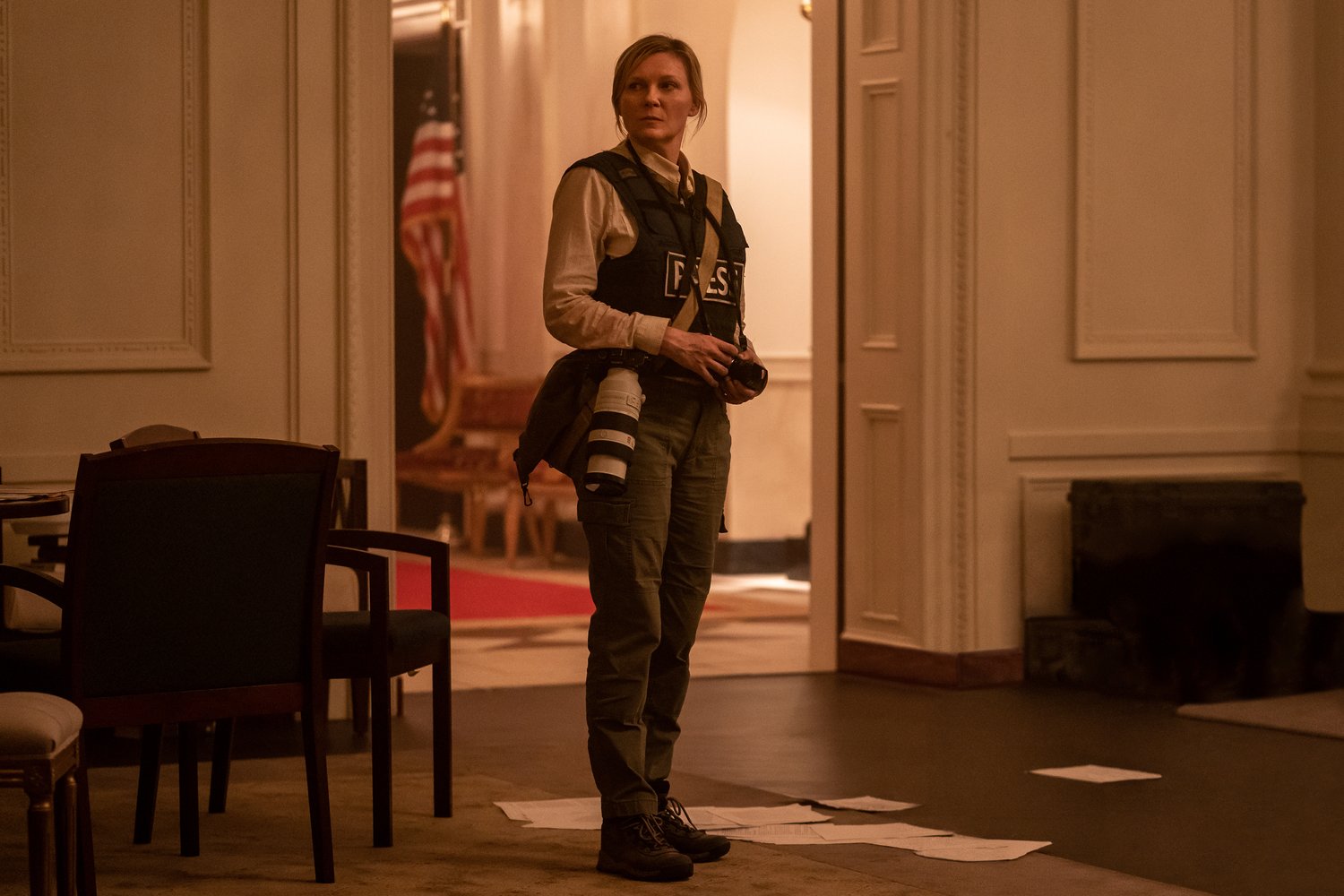Images courtesy of A24
CIVIL WAR– 3 STARS
LESSON #1: NO ONE WINS A CIVIL WAR– One does not have to do a deep search for powerful quotes of wisdom about war or civil war. The Bible drops Matthew 12:25 stating, “Every kingdom divided against itself is brought to desolation, and every city or house divided against itself will not stand.” Bertrand Russell remarks, “War does not determine who is right – only who is left.” This critic’s favorite comes from the unheralded Jake Fulton:
“There are no winners of war, only survivors and even they die inside from guilt. They only physically survive to warn us. To warn us that there is nothing more terrible than what they have done.”
Of the many to choose from, this quotation fits the central war journalist figures of Alex Garland’s Civil War. History understands Fulton’s words, and it appears the English novelist and filmmaker does as well. Yet, Civil War takes a decisive lunge apathy because, defying Fulton, the displays of guilt are greatly internalized, physical survival is forever uncertain, and the warnings appear undelivered.
LESSON #2: EVERY WAR FILM IS AN ANTI-WAR FILM IN DISGUISE– Garland’s intentions also strip away the usual bullish traits that lift a war movie closer to an anti-war message. Civil War does not explain its plot’s cause and solutions are outside the main characters. There are no heroes of reverence earning cheers or funerals. Civil War is unapologetic to battlefield death. Likewise, for the most part, accountability and comeuppance are absent to acts of villainy. Unlike its manufactured marketing campaign featuring famous American landmarks under siege, Civil War does not dwell, liberate, or lionize any of that iconography or patriotism. Across the board, swells of pride, honor, and, highest of all, glory are low or even nonexistent.
If you need those traits or the pontification of louder talking points in your war movies, Civil War is going to be an empty experience and spectacle. Why? Because again, no one wins in a civil war. Apathy exists and wins instead through a constant mood of nearly callous disillusionment. On the other hand, if you don’t need the spoon-feeding and welcome your own search for the rational or irrational that could be dirty or delicate at any moment, Civil War may be the ideal type of havoc to dissect.
Best we can tell in Civil War, the country is nearing the end of an extended conflict. The Western Alliance of Texas and California (how’s that for an opposite pairing?) has been deemed an illegal separatist government by the unnamed President of the United States of America (Nick Offerman, using his deadpan delivery to the fullest). A Florida offshoot insurrection has been squashed and most of the middle of the U.S. is laying low and “pretending this isn’t happening.” This is precisely a portion of the premise that will cause the more militant, involved, or ardent types of viewers to question how anyone could possibly stay out of something like this.
For better or worse, Alex Garland (Men, Ex Machina) skips that big question and many more in Civil War that would better answer more of the how or why, and funnels any microcosms or epiphanies through its group of war correspondents. The Power of the Dog Oscar nominee Kirsten Dunst and Wagner Moura of The Gray Man are the team of Lee and Joel. The former is a world-renowned photojournalist and the latter is more the interviewer and the trusty handler. They’ve recently witnessed a suicide bomber disrupt a water distribution protest in New York City, where they picked up a young, hopeful photographer named Jessie, played by Priscilla breakout Cailee Spaeny. The horrible scene they witness is washed down by cocktails at the press hotel oasis.
LESSON #3: PROPER JOURNALISM AT ITS MOST DIFFICULT– If you know proper journalism, it comes with a difficult neutrality to accept. From their own mouths, their job is “to record so other people ask the questions.” This crew advises the newbie Jessie on that axiom and avoids any inquiries and examinations with detachment and self-discipline during asides and windows of quiet moments off the clock. Any bonding is peripheral. Sure enough, especially radiating from a focused performance from Dunst, there’s a power to watching these cinematic guides put themselves in harm’s way, even with the implausibility that such press would be welcomed so close to the breach-and-clear squads at the tip of the spear. Furthermore, much like the citizens and states avoiding the civil war, there’s a “how could they just watch” disengagement that is a complicated character trait for viewers to connect with. The answer is normally: If they didn’t, who would?
After New York City, Lee and Joel agree to form a four-person team with Jessie and the aging veteran journalist Sammy (Stephen McKinley Henderson, straight-shooting sagacity every second the camera finds him) to make the journey to Washington, D.C. in time for the upcoming Fourth of July. Joel predicts the symbolic holiday will spur an offensive that could become the deathblow to the war. Sammy and several other colleagues consider this journey a suicide mission or death sentence to a place where other journalists have been labeled as “enemy combatants” and executed. The draw of the potential story is too much as they embark their SUV through an odyssey of scrapes and encounters as they drive off the main roads through the Mid-Atlantic podunk bowels of a “well-regulated militia.”
Going back to Lesson #1, one has to wonder if Civil War needed a few of those pillars, principles, and tropes it denounces and avoids. Frankly, they wouldn’t have hurt. In spite of the arm’s length vessel of journalistic neutrality at its core, Garland wrote and directed the ideal gray protagonist in Kirsten Dunst’s Lee Smith. The actress was allowed to play this as grim as a heart attack. While convincingly taciturn, her character exudes the proper weathered edges that come from years of emotional wear-and-tear and current predicament of seeing a headstrong younger version of herself in the mirror with Spaeny’s Jessie. Dunst shows the most color in a film that is politically as monochromatic as the photography being taken. Notwithstanding, delivering on the defined intention of not choosing sides counts an accomplishment of austerity for Garland.
Where Alex Garland dips his toe into more subversive territory for Civil War is with his cleverly off-kilter soundtrack choices and a final act of massively escalated perils. In both moments of plot advancement and reflective pauses, the non-mainstream choices– including tracks by Suicide, De La Soul, and Sturgill Simpson– curated by music supervisor Simon Astall (Love Lies Bleeding) act as coping inserts, subironic plugs, and screwdrivers tightening nerves. The incidental score from the duo of Geoff Barrow and Ben Salisbury (Men) takes a backseat to these sung stingers. They stoke the aforementioned mood of disillusionment without being a full tailspin or descent into madness.
The same can be said of the .50-caliber finale when the heavy aerial and terrestrial war wagons arrive en masse and the shit hits the fan. Matching his deft sense of provocative optics going back to the less-is-more Oscar-winning visual effects of Ex Machina, Garland enlisted an ideal amount of VFX as matte backgrounds and inserted layers of damage. Seeing the picturesque nation’s capital turned into a visceral nighttime war zone– where the Lincoln Memorial stands a fortified stronghold and the finery of The White House is dimmed into a video game-like labyrinth– is a jaw-dropping climactic setting. Still, it’s too little explosiveness too late. During the time when the knock down-drag-out spectacle finally shows up at its fever pitch peak for Civil War, the dispassionate stances and reactions consume it all. You will exhale air of resigned consolation more than inhale breaths of moving eminence.
LOGO DESIGNED BY MEENTS ILLUSTRATED (#1191)



